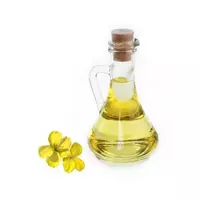Rapeseed oil

This oil is derived from the seeds of a plant called rapeseed. At the moment, rapeseed oil has acquired the status of one of the most popular types of vegetable oil in European countries. In cooking, it is used mainly in the process of preparing marinades, snacks, cold dishes, mayonnaise and other types of sauce. It is important that, according to statistics in Europe, this type of oil is the third after olive and linseed in the rating of oils in terms of taste and useful properties, while outstripping sunflower oil.
Rapeseed oil, like sunflower oil, is refined and unrefined. A distinctive feature of this product is the property of maintaining transparency for a long time without acquiring an unpleasant smell. If rapeseed oil is stored in a cool, dark place, it will not lose its taste even after five years.
More recently, there was a problem in the use of rapeseed oil, since a fairly large amount of erucic acid was found in its composition, which is very harmful to the body. The fact is that it is not excreted from the human body, not only that, it can even accumulate, which leads to a slowdown in growth and disorders of other vital systems. However, after lengthy experiments, Canadian scientists were still lucky enough to bring out a variety of rapeseed in which the content of harmful erucic acid was no more than 2%. Therefore, it has become possible to use rapeseed for the production of vegetable edible oil and margarine.
Benefits of rapeseed oil
The benefit of rapeseed oil is certainly that this product is rich in polyunsaturated fatty acids, which are designed to strengthen the walls of blood vessels and lower cholesterol. In addition, these acids can prevent the risk of blood clots. With a high calorie content of rapeseed oil (899 kcal per 100 grams), just one tablespoon per day is quite enough to replenish the body with these important elements.
The benefits of rapeseed oil are beyond doubt, due to the fact that it also includes linolenic acid, with a deficiency of which blood vessels narrow in the body and blood circulation is impaired, as a result of which a stroke and myocardial infarction can occur.
The harms of rapeseed oil
Do not forget that when cooking, during strong and prolonged heating, all the beneficial properties of rapeseed oil are lost, and toxic compounds come in their place. Therefore, in order to avoid possible harm to rapeseed oil, it should be used cold as a dressing, avoiding temperatures above 160 & ordm; C.
rapeseed oil 899 kCal
Energy value of rapeseed oil (Ratio of proteins, fats, carbohydrates - ju):
Proteins: 0 g (~ 0 kCal)
Fats: 99.9 g (~ 899 kCal)
Carbohydrates: 0 g (~ 0 kCal)
Energy ratio (b | y): 0% | 100% | 0%
 Español
Español Français
Français Português
Português Русский
Русский 简体中文
简体中文 繁體中文
繁體中文 日本語
日本語 한국어
한국어 العربية
العربية Türkçe
Türkçe Қазақ
Қазақ Deutsch
Deutsch Italiano
Italiano Українська
Українська
